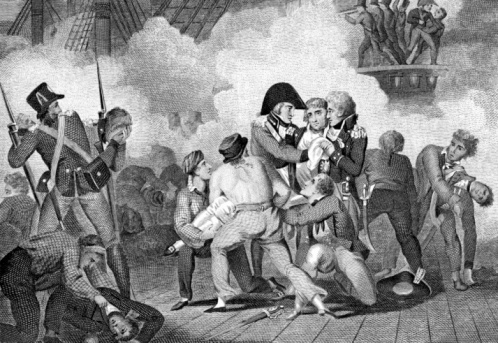This month in history: Battle of Trafalgar
 'England expects that every man will do his duty’
'England expects that every man will do his duty’
The Gazette marked Admiral Horatio Nelson (KB) and the British fleet’s decisive part in the Napoleonic wars with an Extraordinary edition on 6 November 1805, publishing Collingwood’s despatch from the battle of Trafalgar in full (Gazette issue 15858).
News of Trafalgar didn't reach Britain until 5 November, over a fortnight after the battle of 21 October. It was greeted with celebration of a decisive victory, but national sorrow at the loss of a national hero.
The battle was the engagement of the Royal Navy against the combined fleet of the French and Spanish navies during the War of the Third Coalition. The victory was achieved in part through Nelson's departure from the prevailing naval tactical orthodoxy in advancing in two separate lines.
Just before midday, off Cape Trafalgar, Nelson made the famous signal using Popham's telegraphic code to his fleet of 33 ships, ‘England expects that every man will do his duty’, and the fleet formed into the two columns. Vice Admiral Cuthbert Collingwood led the HMS Royal Sovereign line of attack, Nelson’s HMS Victory the other.
In Collingwood’s despatch, the battle formations are described: ‘The Enemy’s line consisted of Thirty-three ships (of which Eighteen were French and Fifteen Spanish)’. Commanded by Vice Admiral Pierre-Charles Villeneuve, they formed a concave crescent. The leading ships of the columns then broke through the enemy’s line. According to Collingwood, ‘the conflict was severe; the Enemy’s Ships were fought with a Gallantry highly honourable to their officers’.
Collingwood continues, ‘the attack on the enemy was irresistible, and it pleased the Almighty Disposer of Events to grant His Majesty’s Arms a complete and glorious Victory.’
The death of Nelson
HMS Victory collided with Redoutable, becoming tangled in its rigging. At about 1.15pm, during the battle, Nelson was hit by ‘a musket ball to his left breast’ from the Redoubtable. He was knocked to the deck, the wound being clearly mortal. Nelson died just before 4.30pm, while aboard HMS Victory, captained by Thomas Masterman Hardy (GCB), to whom Nelson uttered the famous words, 'Kiss me, Hardy' (which Hardy did, twice). Before Nelson died, Hardy reported that the battle was won, and the words, 'Thank God, I have done my duty' and 'God and my country' were Nelson’s last.
Nelson’s body was placed in a cask filled with brandy for preservation, and was transported to Gibraltar on HMS Victory, arriving on 28 October 1805. For 3 days, from 4 January 1806, Nelson’s body lay in state in Greenwich Hospital’s Painted Hall.
Nelson’s demise is referred to by Collingwood as ‘the ever to be lamented Death’, but that Trafalgar, as it was later coined by King George III, was a victory that will ‘add a Ray to the Glory of His Majesty's Crown, and be attended with public Benefit to our Country’.
Honours and recognition
On the death of Nelson, Collingwood assumed the command-in-chief and was made Baron Collingwood in 1805 (Gazette issue 15859).
Captain Henry Blackwood (GCH, KCB), of HMS Euryalus, merited mention in the despatch, ‘whose Vigilance in watching, and giving notice of the Enemy’s movements, has been highly meritorious’. The French and Spanish fleet was spotted by Blackwood, and the British fleet was alerted. He witnessed Nelson's will together with Captain Hardy, and attended Nelson’s funeral at St Paul's cathedral.
Hardy was created a baronet on 29 January 1806 (Gazette issue 15885) and promoted to rear admiral in 1815 (Gazette issue 16972). He carried one of the banners at Nelson's public funeral procession on 9 January 1806 (Gazette issue 15881), where the body was ‘covered with a Black Velvet Pall, adorned with escutcheons, under a Canopy support by six admirals’. Hardy was advanced to Knight Grand Cross of the Order of the Bath on 13 September 1831 (Gazette issue 18851) and promoted to vice admiral in 1837 (Gazette issue 19456).
Nelson's brother, William, was created Earl Nelson and Viscount Merton of Trafalgar and Merton in the County of Surrey (Gazette issue 15859) in November 1805, in recognition of his brother's service.
In Collingwood’s words, ‘Such a battle could not be fought without sustaining a great Loss of Men’. 1,690 British were killed or wounded, with no ships lost. The French and Spanish suffered 6,953 casualties, with 19 ships lost.
Nelson’s victory established the British navy as the most powerful in the world. Revered at home and abroad, he was an outstanding naval tactician – a hero of gentle character, yet capable of ruthless aggression.
See also
Trace your Trafalgar ancestors with The National Archives, a database containing.18,000 plus individuals who fought in the Battle of the Trafalgar on the side of the Royal Navy.
